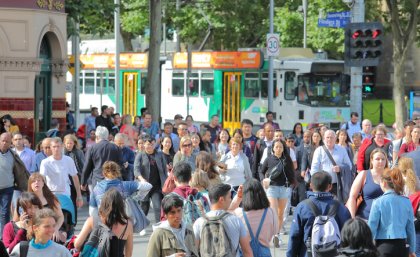
Australians’ willingness to accept immigrants and asylum seekers is heavily influenced by the neighbourhoods they live in, a University of Queensland researcher has found.
Social scientist Dr Timothy Gravelle analysed the effects of changing immigrant concentration in neighbourhoods and attitudes toward immigration and asylum policy.
“The demographic composition of a person’s neighbourhood and the rate of change in immigrant concentration are crucial aspects in a person’s political decision-making,” Dr Gravelle said.
“Migration is seen as a crisis across the western world, with the issue of economic migrants provoking anxieties and perceptions of economic and cultural threats among sections of the native-born population in Australia.”
The UQ Institute for Social Science Research’s Dr Gravelle drew on data from the Australian Election Study (2010–2016) and local-level census data for his research.
“I sought to explain Australians' attitudes toward immigration and asylum policy by concentrating on the roles of party identification, local demographic context and the interplay between those two factors,” he said.
“The rise of anti-immigration sentiment in Australia in recent years, compounded with a high rate of net migration, is making immigration a particularly politically charged issue.”
“Whether Australians express ‘open’ or ‘closed’ attitudes toward immigration and asylum-seekers is shaped by an individual’s local environment interacting with their political beliefs,” Dr Gravelle said.
The research showed Coalition supporters were more ‘closed’ in their attitudes toward migrants and Greens supporters were more ‘open’, regardless of where they lived.
Labor supporters’ views become more ‘open’ in areas with more migrants.
At the same time, all segments of the Australian electorate become more closed in their attitudes toward migrants when their neighbourhoods are undergoing demographic change, with more migrants moving in.
“The significance of this research lies in how it shows that all segments of the Australian electorate become more closed in their attitudes toward migrants when their neighbourhoods undergo demographic change and more migrants move in,” Dr Gravelle said.
The research is published in Social Science Research (DoI 10.1016/j.ssresearch.2019.03.005).
Contact: Dr Timothy Gravelle, t.gravelle@uq.edu.au, +61 7 336 51763, +61 (0) 407 700 626.










